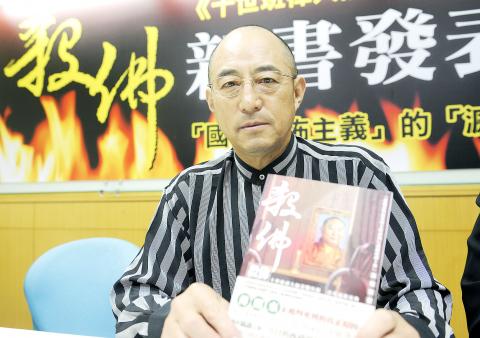|
Tibet must be lesson for Taiwan:
dissident
By Chris Wang / Staff reporter

Chinese dissident and author Yuan
Hongbing promotes his book Shafo in Taipei yesterday.
Photo: George Tsorng, Taipei Times
The 10th Panchen Lama was murdered by
former Chinese president Hu Jintao (胡錦濤) and former Chinese premier Wen Jiabao
(溫家寶), a prominent Chinese dissident said in Taipei yesterday as he warned that
Beijing’s cultural genocide in Tibet could serve an example for those Taiwanese
who still have false expectations of China.
Citing the findings from his private interviews with Chinese and Tibetan
officials, Yuan Hongbing (袁紅兵) told a press conference that the 10th Panchen
Lama, Choekyi Gyaltsen, was poisoned to death in January 1989 rather than dying
from a heart attack as the Chinese Communist Party (CCP) claimed.
Yuan, a Chinese writer who sought political asylum in Australia in 2004,
detailed the findings in a book he co-wrote with Tibetan author Namloyak
Dhungser titled Shafo (殺佛) — killing a Buddha — which has since been published
in Taiwan.
The assassination was plotted by former Chinese presidents Deng Xiaoping (鄧小平)
and Li Xiannian (李先念), and Bo Yibo (薄一波), father of disgraced Chinese official
Bo Xilai (薄熙來), and he was executed by Hu and Wen, said Yuan, who first revealed
the allegation in 2011.
However, the reason Taiwanese should pay attention to Tibet is far more than the
Panchen Lama’s death, he said, as they should understand that Beijing’s cultural
genocide spanning several decades had caused the death of 1.2 million Tibetans
and at least 126 cases of self-immolation in recent years.
“I would say that Tibet is far away and close to Taiwan at the same time,
because what happened and is happening in Tibet could happen in Taiwan in the
future,” Yuan said. “When President Ma Ying-jeou (馬英九) suggested that the
cross-strait flights are domestic flights, that told you how close Taiwan could
be to becoming the next Tibet.”
The signing of a peace agreement with Beijing in 1951 and the retreat from being
an independent country to an autonomous region had both failed to bring Tibetans
the peace and religious freedom they deserve, Yuan said, and the CCP was never
serious about keeping its promises.
“[Beijing] has never stopped oppressing the Tibetan people in the past six
decades. When you realize that, I don’t know what expectations Taiwanese could
have of the CCP,” Yuan said.
National Taiwan University Hospital physician Ko Wen-je (柯文哲), who is mulling
running in the Taipei mayoral election next year, said Yuan’s book was a
reminder to Taiwanese about what they could learn from Tibet.
“It is also important for Beijing to understand that what happened in Tibet was
why most Taiwanese still have doubts about China’s ‘peaceful unification’
pledge. Past experiences show that the CCP has not been trustworthy,” Ko said.
|
![]()
![]()
![]()